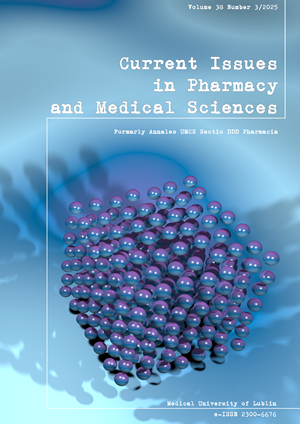Survey of pharmacist’ opinion and knowledge on Adverse Drug Reactions reporting in Poland
DOI:
https://doi.org/10.12923/cipms-2025-0027Keywords:
patient safety, adverse drug reaction, pharmacy practice, pharmavovigilanceAbstract
Reporting adverse drug reactions (ADRs) is an extremely important procedure that affects patient safety. ADR reporting is the responsibility of every medical professional, including pharmacists.
In the research, the aim of this study is to verify if pharmacists in Poland are ready to report adverse drug reactions. The research has been conducted via survey questionnaire within the tricity of Gdynia, Sopot and Gdańsk. The questionnaire consisted of thirteen questions, and every pharmacist with license to practice was allowed to participate in this study. The results indicate that Polish pharmacists assess their level of knowledge about reporting side effects at a moderate level. This may be due to the low popularity of training in this area. Moreover, the staff of community pharmacies have a lower perception of their level of knowledge about reporting ADR than do employees of hospital pharmacies and other related places (p<0.001). In addition, hospital pharmacists have more experience in ADR than those employed in community pharmacies, and pharmacists with a specialist title are more aware of the obligation to report ADR (p=0.023). Patients very rarely report side effects to pharmacists and this is indicated as the main reason for the lack of ADR reporting by this professional group. We conclude that pharmacists in Poland are not ready to report ADR, and more training is necessary.
References
1. Kopciuch D, Zaprutko T, Paczkowska A, Ratajczak P, Zielińska-Tomczak Ł, Kus K, et al. Safety of medicines – Pharmacists’ knowledge, practice, and attitudes toward pharmacovigilance and adverse drug reactions reporting process. Pharmacoepidemiol Drug Saf. 2019;28(12):1543-51.
2. Act of September 6, 2001. Pharmaceutical Law. Journal of Laws 2001, No. 126, item 1381.
3. Act of November 6, 2008 on patient rights and the Patient Ombudsman. Journal of Laws of 2009, No. 52, item 417.
4. Act of December 10, 2020 on the profession of pharmacist. Journal of Laws 2021, item 97.
5. O’ Donovan B, Rodgers RM, Cox AR, Krska J. Identifying and managing adverse drug reactions: Qualitative analysis of patient reports to the UK yellow card scheme. Br J Clin Pharmacol. 2022;88(7):3434-46.
6. European database of reports of suspected harmful activities – Competent administrative authorities. [https://www.adrreports.eu/pl/national.html] (access: 2.07.2024)
7. European database of suspected adverse drug reaction reports. [https://www.adrreports.eu/] (access:2.07.2024)
8. Wiela-Hojeńska A, Łapiński Ł. Niepożądane działania leków – rodzaje, podział, przyczyny i skutki ekonomiczne. Farm Pol. 2010; 66(4):275-88.
9. How to report a side effect. Office for Registration of medicinal products, medical devices and biocidal products. https://www.gov.pl/web/urpl/jak-zglosic-dzialanie-niepozadane2 (access:2.07.2024).
10. Li R, Curtain C, Bereznicki L, Zaidi STR. Community pharmacists’ knowledge and perspectives of reporting adverse drug reactions in Australia: a cross-sectional survey. Int J Clin Pharm. 2018;40(4): 878-89.
11. FIP Global Pharmacy, Worforce Report 2012. International Pharmaceutical Federation. https://www.fip.org/files/members/library/FIP_workforce_Report_2012.pdf (access:2.07.2024).
12. Karuppannan M, Mohamad Rizal NAN, Wong KT, Mohd. Ali S, Ting KN, Boardman H. Pharmacists’ experiences on adverse drug reaction: 10 years later. Front Pharmacol. 2022;13.
13. Vessal G, Mardani Z, Mollai M. Knowledge, attitudes, and perceptions of pharmacists to adverse drug reaction reporting in Iran. Pharm World Sci. 2009;31(2):183-7.
14. Green CF, Mottram DR, Rowe PH, Pirmohamed M. Attitudes and knowledge of hospital pharmacists to adverse drug reaction reporting. Br J Clin Pharmacol. 2001;51(1):81-6.
15. Hämmerlein A, Griese N, Schulz M. Survey of drug-related problems identified by community pharmacies. Annals of Pharmacotherapy. 2007;41(11):1825-32.
16. Elkalmi RM, Hassali MA, Ibrahim MI, Jamshed SQ, Al-Lela OQ. Community pharmacists' attitudes, perceptions, and barriers toward adverse drug reaction reporting in Malaysia: a quantitative insight. J Patient Saf. 2014;10(2):81-7.
17. Shaik Rahmat S, Karuppannan M. Barriers to adverse drug reaction reporting in Malaysia: A narrative review based on theoretical domains framework. JPHSR. 2021;12:626-32.
18. Vigneshwaran E, Harichandana V, Sadiq MMJ, Alavudeen SS, Khan NA, Ahmed T. Knowledge, attitude and practice of community pharmacists towards adverse drug reactions reporting. JYP. 2020;12(1):75-80.
19. Yalgaw Zimamu L, Chanie Agimas M, Mehiret Wubet G. Assessment of knowledge, attitude, and practice of adverse drug reaction reporting among community pharmacy in Gondar Town, Ethiopia, 2021. Research Square. https://doi.org/10.21203/rs.3.rs-1188341/v1.
Downloads
Published
Issue
Section
License
Copyright (c) 2025 Authors

This work is licensed under a Creative Commons Attribution-NonCommercial-NoDerivatives 3.0 Unported License.


